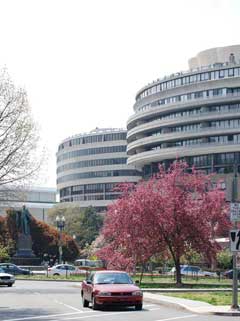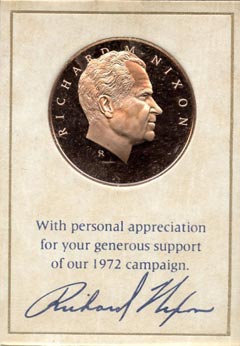Watergate at 40
(June 3, 2012)
In August of 1974, my parents and I made our first trip to Walt Disney World. My two most vivid memories of that visit are a) of becoming delirious under the scorching Florida summer sun to the point that It's A Small World played repeatedly, uncontrollably in my head for about ten hours and b) of watching the Audio-Animatronic U.S. chief executives in The Hall of Presidents.
By the way, had Walt Disney still been living when that Hall of Presidents was developed for the Orlando resort, the attraction would have been called "One Nation Under God."
After the figures of George Washington and Abraham Lincoln spoke their spiels while the other "presidents" nodded and whispered to each other, a roll call was conducted. During this, each puppet stood and nodded. The last effigy to rise was the 37th president, Richard M. Nixon. He was supposed to be the current president, however on that 1974 late-August day, he was no longer. He had resigned office a couple weeks earlier. The Disney people had yet to work up and install a Gerald R. Ford.
When "Nixon" stood and nodded, the audience, who had theretofor been enraptured in silent respect by the marvel and patriotism of the pageant, broke out in snickering.
That moment of suppressed laughter with a tone of cyncism and weariness is, to me, the closing event of Watergate, at least as that affair affected my child's life.
For two years, it had been like an airliner crashing into The Pentagon every couple of weeks. Its milestone events had been the ledes of many a radio news broadcast every hour on the hour. Turn on the TV circa 1973 and instead of Adam-12 or The Odd Couple there would often be Senator Sam J. Ervin banging his gavel. It's hard to believe that the North Carolina Democrat would be 116 years old now.
Today I enjoy asking my young colleagues if they could imagine The Big Bang Theory or American Idol or whatever they watch in prime time being preempted by broadcasts of congressional hearings. They cannot, of course conceive of such interruptions happening any more than they can understand what it was like to have only four networks and a few local stations, all of them accessible only with antennae.
If that doesn't sound sufficiently paleozoic, viewers could not only not watch programs "on demand," they hadn't the means to record any.
It was also the first time in the 20th Century that the character of a U.S. president was questioned so publicly and officially.
Like most kids, I had been taught that presidents, like policemen, are our friends. I became aware that people can really hate a president and wear it on their sleeves. I may be wrong but I think that the Nixon era may have been the first time (again in the 20th Century) that negative bumperstickers and other media about officeholders and candidates appeared.
Even before Watergate anti-Nixon memorabilia was seen in my neighborhood. You how can imagine how popular Nixon was in Washington, DC and its suburbs. He was liked about as much as Rick Santorum.
I also remember, when we ventured beyond The Beltway, my father being asked, as if his working a block from The White House admitted him to inside information,"What's going on down there?" One answer I recall was "Nixon has bad advisors." Certainly that was true.
One bit of advice that Dad dispensed to me more than once was "Stay away from politicians! Don't get mixed up with politicians!" Except for a college-age summer when I worked for a political organization on Capitol Hill, I have followed his advice and I have witnessed enough to make me glad that I have done so.
The more one tries to put faith in God, the less use one has for politicians, the more aware one becomes of such things as God's good time wherein He will solve problems when He wants to, how He wants to and using whom He wants to.
I've lived long enough and have read enough history to see and understand that things go and come again. One decade communists, or Catholics, or gays seem to be the future; the next decade they're being hunted. History rotates in cycles, but as the person of faith in a saving God must believe, He nudges it upward while it spins.
Among the few politicians that my father had respect for, one was Richard M.Nixon. Another that Dad liked was Harry S. Truman. The admiration wasn't ideologically based. In those days, there were no life-and-death issues such as abortion in any agenda.
I suspect that the admiration originated with personal encounters that Dad had with Nixon and Truman when he worked on Capitol Hill in the 1950s. Former President Truman was an occasional visitor to The Capitol. As Eisenhower's vice president, Nixon was President of The Senate and in charge of seeing through Congress the president's legislation, including Civil Rights acts. These were a Republican initiative.
I gathered from the stories that Dad told that both ex and future presidents were nice guys, nice enough to stand out as such in a building full of politicians, including JFK and LBJ. Nixon would chat with lowly congressional staff and cops (My father worked on The Hill as both staffer and cop). The Vice President would pose for pictures with tourists.
The good impression that Nixon left on Dad was sufficient to make him contribute to the president's 1972 reelection campaign. This was rewarded with the medal at right. Dad may have also addressed a letter to Nixon. At any rate his support was impressive enough to the Nixon people that someone from the Committee for The Reelection of The President ("CREEP") contacted him and asked him if he would like to work for the campaign. Following his own advice, Dad said no. He would have also had to quit his job at The National Labor Relations Board.
Certainly, given the role that CREEP played in Watergate, it was wise to pass on the offer, although a fraction of that money donated for reelection probably went to pay for the Watergate burglars' defense.
Richard M. Nixon was one of those people who can be safely described as complex. When the 1960 election was stolen from him by the Texas and Chicago Democratic machines, he refused to contest it for the good of the country. He shepherded early civil rights legislation. He hired an historic number of women for the White House staff. He got us out of the Viet Nam stalemate and started dialog with other powers that were ready to destroy the world twenty times over.
However, no matter what he did, he could not get a break from the press. I think this is what provoked his tragic villainy. Yes, he should have remembered that there was a silent majority who liked him enough to elect him president and reelect him by a landslide. However, when you're the smartest guy in the room, but everybody in the room is always fawning over suntanned philanderers with mediocre intellects and purchased Harvard degrees, it can be frustrating. It can be deranging.
Why so much animus against Nixon when others before and after him committed as much or worse? Certainly part of it originated in liberal hypocrisy. I think it was also rooted in class.
People of Nixon and my father's generations did not come from humble backgrounds, work their way through school, fight in wars to become journalists. They became lawyers.
Journalists tend to come from affluent suburbs, from the middle and upper strata where views of the world are shaped in comfort and in school. If you know anything about liberals born and abiding in affluent suburbs, you know that they are snobs and that they regard non-affluent-suburban-liberals, especially the caucasian ones, as subhumans.
Just as Rick Santorum was in the 2000s, Nixon was one of the subhumans, not one of the cool kids, not the kind of guy that League of Women Voters members have crushes on.
Even in the late 1940s there was, as there is today, a liberal establishment in the media and in the arts. Congressman Richard Nixon became forever the bug in that establishment's shorts by hunting commies. In 1972, Kennedy Boston pal Benjamin Crowninshield Bradlee, Yalie Bob Woodward and son of card-carrying communists Carl Bernstein, got their chance to show Nixon: "People like you don't do that to people like us."
As I say above, history rotates in cycles. The Watergate tapestry of idealistic journalists and their editor may be unraveling, starting with some threads yanked by Bradlee himself. On tape he said that Watergate would have been nothing without Nixon's resignation and expressed doubt that the meetings with Deep Throat happened as described (1).
Let us see if the heroes of one era become the villains of the next.
(1) See Pat Buchanan's column The Unraveling Myth of Watergate
 |
|---|
 |
| Copyright 2012 by Neal J. Conway. All rights reserved. About this site and Neal J. Conway nealjconway.com: Faith and Culture Without The Baloney |